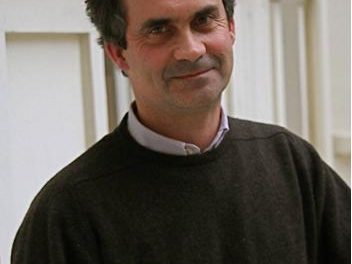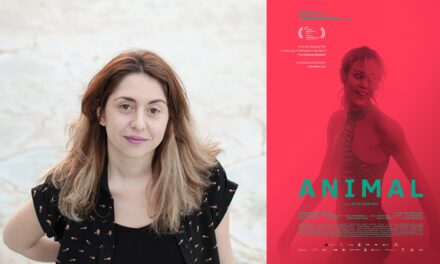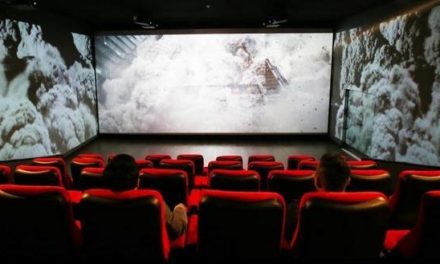“Too much info clouding over my head”, by Vassilis Christofilakis, is a mumblecore, feel good comedy about an overanxious young director searching for success, whose life is further complicated when he is forced to raise money for a movie screenplay he actually detests. Christofilakis is an actor, director and writer who grew up in Athens. He did film studies in the UK and worked in Greek theatre as a director and playwright for several years. “Too Much Info Clouding Over My Head”, which is his first completed feature film and acting debut, won 3 awards at the 58th Thessaloniki International Film Festival: The FIPRESCI Award for Best Greek Film, the ERT ‘New Cinema’ Award and the Greek Film Centre Award for Best Debut Film.
Interviewed by Greek News Agenda* Christofilakis talks about personal and artistic freedom and explains how he works with comedy and why his protagonist is someone many generations in the Western World can identify with. He also explains why being almost broke when making films can be a period of bliss as well as why we love losers (in the cinema).
Wasn’t there a longer title for your film?
When I was contemplating the plot, I thought initially of “Too much Info”. But I wanted a long title that would create a strange feeling. I tried to find a Greek title, but whatever I came up with didn’t seem appropriate. I was influenced by other mumblecore films. Mumblecore is considered the newest film genre which appeared a decade ago, and some of the films have long titles. But Woody Allen also used long titles (think e.g. “Everything you wanted to know about sex but you were afraid to ask”). There is a mass of info, so many things that the protagonist is burdened with that I couldn’t end up with a single word title. To sum up, I did it instinctively.
Eleni Ouzounidou, Vassilis Christofilakis, “Too much info clouding over my head”, (2017)
“Too much info” is a coming of age just before the coming of middle-age film for a man who doesn’t really want to grow up. Your protagonist is rather dysfunctional. What is wrong with him and – at the same time – what is so relatable about him? Is he a loser, an ideologist, a psychopath or all of the above?
First of all he is a loser; the loser is a prerequisite for comedy to work. When we do comedy, we take away abilities from the protagonist, whereas in drama we add abilities. The more abilities we substract and the more problems we add which the protagonist lacks the ability to overcome is where comedy starts. So he is clumsy, aggressive, and is also an idealist without a cause some or most of the times, but his chief dysfunction is that he is trapped in the old ways, in a mythology others have constructed for him. He feels he has to make a film that he doesn’t really want to make, but he has to build a career, a reputation. He is also trapped in his relationship with his parents: his mother, his dead father and the antiques he inherited which he must sell in order to make films. His mother pushes him to be an artist and create masterpieces. He doesn’t necessarily want to make masterpieces. So this is his most dysfunctional characteristic, that he is subject to other people’s wishes or mythologies and the coming of age element is that he is trying to construct his own mythology.
Vassilis Christofilakis, “Too much info clouding over my head”, (2017)
So he is a captive to his overprotective mother’s dysfunctions, because she dreams of becoming the mother of a great artist.
Exactly; as strange as it might sound, I see the mother as the villain of the story. She is not a traditional villain, but whenever she interferes, she creates problems, despite her good intentions. The connection that exists between mother and child since birth makes his mother a very difficult opponent, because it is very difficult to overcome your parents. And I think my protagonist is relatable, because he is the type of person found everywhere in the Western world with characteristics we can all identify with.
“Too much info” won a series of awards at the 58th Thessaloniki International Film Festival and that is quite remarkable for a comedy. It was also very warmly received by the audience. Where do you attribute its success?
The TIFF is a friendly festival and I had a lot of interaction with the audience. What struck me was the fact that although I had the millennials in mind, the generation born in the 80s, teenagers told me they were enormously touched by the film, as well as others born in the 70’s, whom we call generation X. I was expecting people in their sixties to appreciate it, because it would make them think about their parenting ways.
The common denominator of all reactions was: “a comedy at last”. I didn’t do a comedy on purpose. On contrary, I thought that comedies don’t do well at festivals. People told me they are weary of dramas, as critics did. I was told that it’s a cool, down to earth film that makes audience laugh and identify with, which also had a psychoanalytical depth, a smart comedy. They also told me that it is very real. Reality or sincerity was not in my intentions. I wanted to do what I liked. The first time that I heard that my film was “real” was at the Festival and, I have to admit, it made me very happy. And this provokes a new anxiety that my next work would also have to be “real”. I’m very much afraid that I’ll try so hard to do something real which will end up very fake.
Kitty Paitatzidou, Vassilis Christofilakis, “Too much info clouding over my head”, (2017)
How did you incorporate your cinematic influences in your film?
I believe that we have to be very open about our influences and show them off without fear that they constitute plagiarism. I used these influences in a very bold way. Years ago, when I was going through a rocky patch artistically, I saw “Frances Ha”, a mumblecore comedy. Back then I had done another film that did not express me at all, so when I saw “Frances Ha” it was revelatory for me. It opened new horizons for me and so I said to myself, “this is what I want to do from now on”.
It goes without saying of course that Woody Allen has been a major influence for me. I like to write, direct and act in my films. I think auteur cinema is the most authentic and personal cinema. I like having full control of my work; and this would be my advice to my peers who are making their first film: to enjoy this period of time, because this time of absolute freedom might not last long. It might be followed by more commercial offers in which you won’t be in control any more. For me, it is important to have control of your work in order to keep your artistic vision intact.
When I saw the film, it reminded me of Tim Burton’s film “Ed Wood”.
I had seen the film a long time ago and I had totally forgotten about it. There are some common elements. I used the fact that my protagonist likes b-movies in order to make him look even weirder. I also used this b-movies element, because it becomes more difficult nowadays for these movies to have an audience. I saw “Ed Wood” again after I completed the film and it’s true they have a lot of things in common.
I’m also influenced by Jim Jarmusch, his dark sense of humor and the way he works with dialogues as well as well as the Coen brothers and their austere cinematic grammar. They use medium frames and single shots for dialogues which I find a sincere and immediate way to shoot dialogues. I also used wideangle lens throughout the film, it was a challenge I wanted to take. When you are shooting a comedy, your frames should be clear, there shouldn’t be ambiguity in comedy. Wide angle lens magnifies movement and slightly deforms faces; it gives them a protruding effect which is an element I used extensively in the film for a comic result.
As far as the use of black and white film is concerned, it was instinctive. I was influenced by “Frances Ha” and “Manhattan”. I wanted the film to have a black and white, New York touch. My film is clearly Greek of course, but I wished for an urban character. There was also an economic parameter in this decision. Black and white made shooting much easier because I didn’t have to work with a gazillion colours. Black and white is a stylistic statement for a film and I have to say that this also attracted the actors. They liked the fact they would play in a black and white film.
Nicol Drizi, Vassilis Christofilakis, “Too much info clouding over my head”, (2017)
What is the role of the city of Athens in your film?
To be honest, I intended to show a few more tourist attractions of Athens, but I avoided it. Athens is there through its people and its interiors of alternative theatres, bars and cafes. There aren’t many shots of Athens as a busy town. To me, Athens can be a quiet town and this comes in contrast with my protagonist who is angst ridden. All shooting took place in Pagrati, which for me is the Greek Manhattan. I was born in Kaisariani, but I’ve been living in Pagrati for 15 yearsnow, and I will never leave Pagrati. As Woody Allen was shooting in Manhattan, I will shoot in Pagrati.
Your film works on many levels. It describes the adventures of film funding. How does that interest those outside the movie industry?
This part of the film contains a sociopolitical comment. It is relevant to anyone trying to fulfill his or her dreams amid considerable difficulties and no support. Moreover, the funding theme is universal. Making a film is extremely difficult in any part of the world. It is difficult in general to make your dreams come true. You have to overcome family and professional bonds. Of course a film maker going through the same experience will become aware of some other details, but the filming story is a pretext to talk about more universal things.
Konstandina Mihail, Vassilis Christofilakis, “Too much info clouding over my head”, (2017)
How has your theatre experience influenced your work?
It has influenced a lot the way I work with actors. I worked many years in the theatre and this helped to get to know the actors and to work with them on a deeper level. To be honest, I didn’t have to work that much in this film with the actors, because I got theatrical actors and since I wanted spontaneity, we didn’t have to do many rehearsals. They felt a bit anxious over this, but at the same time they were alert and gave me the spontaneity I wanted. The actors improvised a lot and I think it all worked fine.
How did you manage to find good actors with a minimum budget?
I had a very specific vision. I had a very small budget, but I managed to pay everyone on time. Everyone knew the money wouldn’t be much. I wanted to finish the film very quickly, with a small crew. Only editing took longer than I expected. Actually, completing this film was one of the most relaxed things I’ve ever done. Many people think it is difficult to act and direct, but for me, having spent many years on the director’s chair it was very invigorating to act and at the same time manage many other things.
Zisis Roubos, Vassilis Christofilakis, Praxitelis Mastoras, “Too much info clouding over my head”, (2017)
What about your future plans?
My future plans will soon become present. I will continue with comedy, maybe under easier circumstances, which I don’t know if it΄s a good thing. I will keep the same model as in “Too much Info”, i.e. I will continue to write, direct and act my film. My new film is similar to “Too much Info” and I will try to improve myself. I consider myself lucky because what I want to do can be done with a minimum budget. If I wanted to do an action film or science fiction it would be really difficult.
One last question: As you said, a loser is a component of comedy. In the eighties, we used to say everyone loves the bad guys in cinema. But it is obvious that we love losers too. Why? What is the hidden charm of losers?
That΄s a good question; I believe we are all losers. It takes a few psychoanalysis sessions to find out about our problems and the cracks in our armour. Comedy talks about the way life is, the same way drama talks about how we would like life to be. Consider Hamlet, in drama he recites his famous monologue “To be or not to be”. In comedy, he might fart while doing so. He could do that, he is a human being, he is alone in the cemetery and no one sees him. We are all losers and that’s why we like losers. Charley Chaplin and Buster Keaton were losers too. You enjoy watching them trying to solve problems and making a bigger mess of it all. Losers usually win in the end, for the sole reason that they didn’t give up, in spite of all difficulties. And this is another reason we love losers. We wouldn’t bear it for losers to lose, that would be tragedy. And I really choose to be an optimist.
* Interview by Florentia Kiortsi.
** The film was projected in the 58th Thessaloniki International Film Festival and was available in the international film viewing professional platform Festival Scope, a TIFF initiative for the promotion of Greek cinema abroad.













